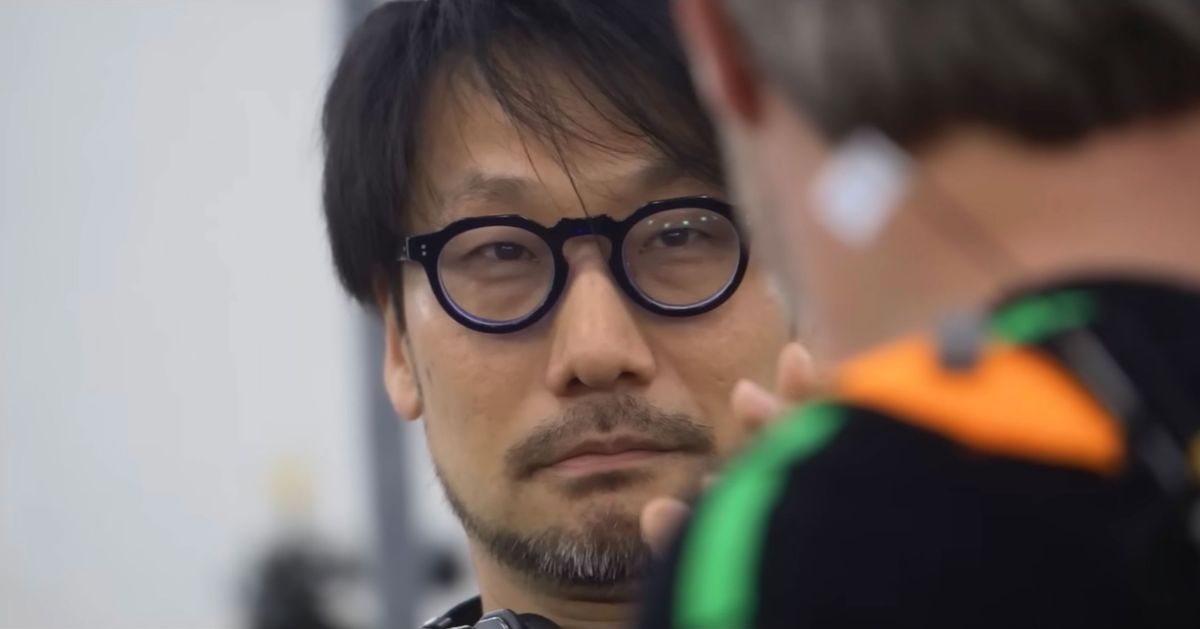
Hideo Kojima Is a Genius. What Else Is New?
Hideo Kojima, 59, has been described by admirers as the Willy Wonka of video games: a Japanese man with iconic round glasses, a knowing look, and strange ideas for how he can make games that are simultaneously fun and art. In the new documentary Hideo Kojima: Connecting Worlds, Kojima’s peers, including other Japanese game developers and director Guillermo del Toro, pay him soundbite after soundbite of compliments, but their praise grows repetitive over time. Kojima is a weird guy, an auteur, a unique entity. Perhaps a “prophet”? The list goes on. The film is a tidy 60 minutes and notably misses a mention of some of his earlier work, including the original Metal Gear games and more obscure titles that helped Kojima build his reputation as a celebrated auteur.
Connecting Worlds unfolds as an illustrious behind-the-scenes look at the making of Death Stranding, Kojima’s latest game, which launched at the end of 2019 with a story line that consumers noted bore a striking resemblance to the global COVID-19 pandemic. The film was directed by British filmmaker Glen Milner, who has made other behind-the-scenes documentaries, including Danceworks, which looks at dancers, and the making of Rogue One: A Star Wars Story. The thing is, there’s not much left to say about Death Stranding, a game best experienced through play or through critique, which includes this excellent Kotaku review that starts with the line “There is no elevator pitch for Death Stranding.”
In 2019, when Kojima debuted the game in collaboration with Sony, I described it in a CNN article as a title that “revolves around ghost babies.” My editor nearly deleted the entire paragraph for not making any sense, but I told him it was definitely important for the story. If you’ve played the game, you know what I mean, and if you haven’t, an explanation of the game’s bizarre events would leave you somewhat confused.
Actors Norman Reedus and Léa Seydoux were similarly befuddled by Kojima’s vision for the game, as they said in the documentary.
“There are so many moments that I’ve had with him where I’m like, What? What are you talking about?” Reedus said on-camera, his tone incredulous. The audience burst out laughing at that line during the film’s screening at the Tribeca Film Festival. Seydoux (No Time to Die, Blue Is the Warmest Color) said she had never worked in games before, and that made it even more difficult to grasp what Kojima was attempting to achieve with Death Stranding.
The film falls flat because it’s exploring a game that’s very difficult to understand, that’s already three years out from launch (a lifetime in gaming), and that has sparse details about Kojima’s personal life. Milner uses some anime scenes to depict Kojima’s childhood in Osaka, but as he noted in the question-and-answer portion after the screening, this part of the film isn’t even accurate — the scenery it showed was of a different area than the one he grew up in.
We do get a glimpse of Kojima’s personality from interviews with him and his collaborators. He’s quirky and meticulous and is involved in most aspects of his games. He works a lot of overtime and is obsessed with films. We learn that his office is across the street from Sony’s and that Kojima is rather stressed about his studio performing well so he can pay his workers.
At one point, Kojima speaks of how he was able to pursue a career in gaming because his dad passed away, describing his dad as a scary man who wouldn’t have approved. He doesn’t tell us how his dad passed away, what age he was, or any other details one might have expected to learn in a doc ostensibly aimed at celebrating Kojima’s work and life.
The film also reflects persity issues within the gaming industry. For nearly half of Connecting Worlds, there isn’t a woman onscreen. Danish film director Nicolas Winding Refn and media entrepreneur Geoff Keighley, who was recently criticized for hosting a video-game showcase with zero women onstage, sing Kojima’s praises. The scenes of Kojima’s office are of male workers. Two of the only women interviewed about Kojima are Grimes, the musician, and Chvrches, a band whose music is featured in Death Stranding. Grimes says of Kojima’s artistry, “It’s in the uncanny valley between comedy and extreme earnestness. I just really can’t tell if it’s a joke or not. I’m just like, Are you fucking serious right now, this is real? And it’s profoundly funny but also, like, deeply sad.”
In some ways, Connecting Worlds is a reflexive microcosm of the publicity problems the gaming industry faces and how misunderstood it can be to Hollywood, even as The Last of Us tops HBO streaming numbers and gaming films like Super Mario, Tetris, and Dungeons and Dragons arrive one after another. Video games are fun to play. They’re tricky to experience in other mediums.
Film, TV, and video games are becoming more like one another. Last December, I interviewed the God of War director, who spoke about his love of shows like Atlanta, Fleabag, and Barry. Still, the industry tends to favor known entities such as sequels and reboots (God of War Ragnarök, the Resident Evil series) and licensed games like Disney and Marvel titles. Kojima tends to make games consumers don’t yet know that they want, such as an action game where the goal is to avoid combat (Metal Gear) or one involving long walks across tough terrain and creating bridges for other players (Death Stranding). In talking about such a storied and idiosyncratic career, you’d expect a director to have more fun.
Related
- A Video Game Auteur’s Quest for Connection































![iFi's GO Bar Kensei Dongle DAC Supports K2HD Technology With Some Samurai Swagger [Updated] iFi's GO Bar Kensei Dongle DAC Supports K2HD Technology With Some Samurai Swagger [Updated]](https://i0.wp.com/cdn.ecoustics.com/db0/wblob/17BA35E873D594/33FF/45A11/QTXOLJR4xDKSNMMk2WlTgjaIlvSgcYpeU1xJzUwIoYs/ifi-go-bar-kensei.jpg?w=768&ssl=1)
























